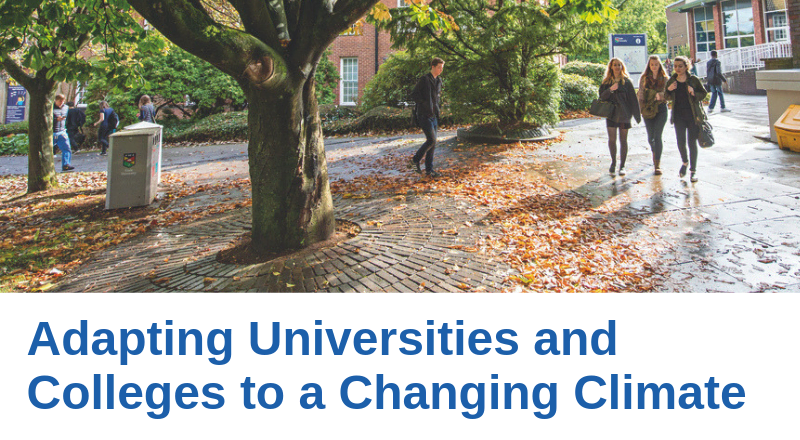New guidance published to help FE prepare for climate change

Leading sector organisations have launched new guidance to make sure colleges and universities are prepared to adapt to the risks of climate crisis.
This guidance is launched at a particularly topical time with widespread global climate strikes bringing much needed attention to research that proves the escalating risks posed by extreme weather. Universities and colleges face direct impact; hazards influence a core element of operations and will be a unique multiplier to existing risks. The guides, ‘Adapting universities and colleges to a changing climate: Making the case and taking action’ and ‘Using an existing organisational resilience framework to develop a Climate Change Adaptation Plan’ have been produced by EAUC (the alliance for sustainability leadership in education) and HEBCoN (the Higher Education Business Continuity Network) with the support of adaptation specialists AECOM and a foreword by UMAL. These are available alongside a number of other support resources and relevant case studies.
Iain Patton, CEO at EAUC, said “The science is settled. Our climate is changing, and no matter how quickly we reduce greenhouse gas emissions, some major effects are locked in. This will influence nearly every area of all universities and colleges, from delivery of teaching, research and examinations, to student recruitment, supply chains, insurance premiums and the profitability of investments. It poses a huge risk.”
The guides outline how the changing climate poses risks to campus and community infrastructure, historically and culturally significant buildings and artefacts, and the wellbeing and safety of students, academics and support staff. It encourages institutions to act early and build resilience, as well as anticipate both direct and indirect climate risks, which will minimise future disruption.
Iain continued: ”Universities and colleges should be at the forefront of the climate damage limitation movement. They have a responsibility as educators, as community pillars and hubs for research to proactively adapt and limit risks. There are a number of institutions leading the way, acting as pioneers and exemplars, but many others are sticking their head in the sand. We are warning universities and colleges that they must take their role more seriously and undertake precautionary climate readiness risk assessments. Otherwise they will drive blindly into this climate emergency.”
Mark Webster, Chair at Hebcon added: ”Climate change will increasingly impact upon the day to day operations and achievement of strategic objectives for universities and colleges. Institutions should act now to identify the risk of climate change disruption and develop appropriate resilience plans to ensure continuity of their business.”
The guides and resources are available on the Sustainability Exchange. They contain:
- An initial self-assessment on climate readiness and climate projections
- Examples of relevant risks and a compilation of resources to support action
- Step-by-step advice on running business impact assessment workshops
- Support on evaluating the risks presented by climate change to key organisational functions
- Examples of necessary actions which may be needed to reduce any significant risks












Responses